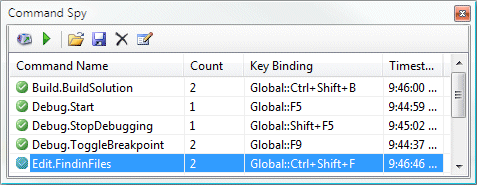Coding Without Comments
If peppering your code with lots of comments is good, then having zillions of comments in your code must be great, right? Not quite. Excess is one way good comments go bad:
'************************************************* ' Name: CopyString ' ' Purpose: This routine copies a string from the source ' string (source) to the target string (target). ' ' Algorithm: It gets the length of “source” and then copies each ' character, one at a time, into “target”. It uses ' the loop index as an array index into both “source” ' and “target” and increments the loop/array index ' after each character is copied. ' ' Inputs: input The string to be copied ' ' Outputs: output The string to receive the copy of “input” ' ' Interface Assumptions: None ' ' Modification History: None ' ' Author: Dwight K. Coder ' Date Created: 10/1/04 ' Phone: (555) 222-2255 ' SSN: 111-22-3333 ' Eye Color: Green ' Maiden Name: None ' Blood Type: AB- ' Mother’s Maiden Name: None ' Favorite Car: Pontiac Aztek ' Personalized License Plate: “Tek-ie” '*************************************************
I’m constantly running across comments from developers who don’t seem to understand that the code already tells us how it works; we need the comments to tell us why it works. Code comments are so widely misunderstood and abused that you might find yourself wondering if they’re worth using at all. Be careful what you wish for. Here’s some code with no comments whatsoever:
r = n / 2;
while ( abs( r - (n/r) ) > t ) {
r = 0.5 * ( r + (n/r) );
}
System.out.println( “r = ” + r );
Any idea what that bit of code does? It’s perfectly readable, but what the heck does it do?
Let’s add a comment.
// square root of n with Newton-Raphson approximation
r = n / 2;
while ( abs( r - (n/r) ) > t ) {
r = 0.5 * ( r + (n/r) );
}
System.out.println( “r = ” + r );
That must be what I was getting at, right? Some sort of pleasant, middle-of-the-road compromise between the two polar extremes of no comments whatsoever and carefully formatted epic poems every second line of code?
Not exactly. Rather than add a comment, I’d refactor to this:
private double SquareRootApproximation(n) {
r = n / 2;
while ( abs( r - (n/r) ) > t ) {
r = 0.5 * ( r + (n/r) );
}
return r;
}
System.out.println( “r = ” + SquareRootApproximation(r) );
I haven’t added a single comment, and yet this mysterious bit of code is now perfectly understandable.
While comments are neither inherently good or bad, they are frequently used as a crutch. You should always write your code as if comments didn’t exist. This forces you to write your code in the simplest, plainest, most self-documenting way you can humanly come up with.
When you’ve rewritten, refactored, and rearchitected your code a dozen times to make it easy for your fellow developers to read and understand – when you can’t possibly imagine any conceivable way your code could be changed to become more straightforward and obvious – then, and only then, should you feel compelled to add a comment explaining what your code does.
As Steve points out, this is one key difference between junior and senior developers:
In the old days, seeing too much code at once quite frankly exceeded my complexity threshold, and when I had to work with it I’d typically try to rewrite it or at least comment it heavily. Today, however, I just slog through it without complaining (much). When I have a specific goal in mind and a complicated piece of code to write, I spend my time making it happen rather than telling myself stories about it [in comments].
Junior developers rely on comments to tell the story when they should be relying on the code to tell the story. Comments are narrative asides; important in their own way, but in no way meant to replace plot, characterization, and setting.
Perhaps that’s the dirty little secret of code comments: to write good comments you have to be a good writer. Comments aren’t code meant for the compiler, they’re words meant to communicate ideas to other human beings. While I do (mostly) love my fellow programmers, I can’t say that effective communication with other human beings is exactly our strong suit. I’ve seen three-paragraph emails from developers on my teams that practically melted my brain. These are the people we’re trusting to write clear, understandable comments in our code? I think maybe some of us might be better off sticking to our strengths – that is, writing for the compiler, in as clear a way as we possibly can, and reaching for the comments only as a method of last resort.
Writing good, meaningful comments is hard. It’s as much an art as writing the code itself; maybe even more so. As Sammy Larbi said in Common Excuses Used To Comment Code, if your feel your code is too complex to understand without comments, your code is probably just bad. Rewrite it until it doesn’t need comments any more. If, at the end of that effort, you still feel comments are necessary, then by all means, add comments… carefully.






